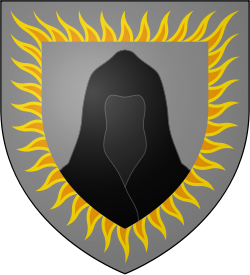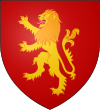House Banefort
| House Banefort of Banefort | |
|---|---|
 | |
| Coat of arms |
A hooded man, black on grey, within a fiery tressure (Cendrée, a hooded man sable within a tressure rayonné along the outer edge gules) |
| Seat | Banefort |
| Head | Lord Quenten Banefort[1] |
| Region | Westerlands |
| Titles |
|
| Overlord | House Lannister |
| Founder | Hooded Man[2] |
| Founded | Dawn Age/Age of Heroes[2][N 1] |
House Banefort of Banefort is a noble house from Banefort in the westerlands, one of the main families sworn to Casterly Rock.[3]
According to semi-canon sources, they blazon their shields with a hooded man, black on grey with within a fiery tressure.[4][5]
Contents
History
The Baneforts were petty First Men kings of the Age of Heroes, claiming descent from the Hooded Man. The last Hooded King was Morgon Banefort, whose thralls were defeated after twenty years of war by Loreon I Lannister, King of the Rock.[2]
According to a semi-canon source,[6] the Baneforts supported Tywin Lannister when he suppressed the Reyne-Tarbeck rebellion.
Recent Events
A Game of Thrones
Lord Quenten Banefort is captured at the battle in the Whispering Wood.[7]
A Clash of Kings
The colors of House Banefort are spotted by Arya Stark leaving Harrenhal with Lord Tywin Lannister's army.[4]
A Storm of Swords
Lord Banefort spends the War of the Five Kings as a prisoner of Lord Jonos Bracken,[1] and he is probably freed when the Brackens submit to the Iron Throne after the Red Wedding.[8]
A Feast for Crows
Lord Banefort is one of the lords who escort the corpse of Tywin from King's Landing to Casterly Rock.[9]
House Banefort at the end of the third century
The known Baneforts during the time span of the events described in A Song of Ice and Fire are:
- Lord Quenten Banefort, Lord of Banefort.[1]
Historical Members
- The Hooded Man, the legendary founder of House Banefort.[2]
- King Morgon Banefort, the Hooded King who was embroiled in a twenty-year-long war with King Loreon I Lannister.[2]
Behind the Scenes
The sigil of House Banefort is a reference by George R. R. Martin to the comic book character Black Hood.[10]
Notes
- ↑ The text states that certain houses trace their roots back to the "golden age of the First Men",[2] a term that could be meant to cover the Dawn Age and the Age of Heroes together. As it is unlikely that no First Men houses of note were founded in the Age of Heroes, we cannot tell if the mentioned houses were founded in the Dawn Age or the Age of Heroes.
References
- ↑ 1.0 1.1 1.2 1.3 A Storm of Swords, Appendix.
- ↑ 2.0 2.1 2.2 2.3 2.4 2.5 2.6 The World of Ice & Fire, The Westerlands.
- ↑ A Game of Thrones, Appendix.
- ↑ 4.0 4.1 A Clash of Kings, Chapter 38, Arya VIII.
- ↑ The Citadel. Heraldry: Houses in the Westerlands
- ↑ georgerrmartin.com: WORLD OF ICE AND FIRE SAMPLE
- ↑ A Game of Thrones, Chapter 63, Catelyn X.
- ↑ A Storm of Swords, Chapter 72, Jaime IX.
- ↑ A Feast for Crows, Chapter 16, Jaime II.
- ↑ The Citadel: Are there any nods to other works in the series?
| ||||||||||||||||||||||||||||||||||||||||||||||
